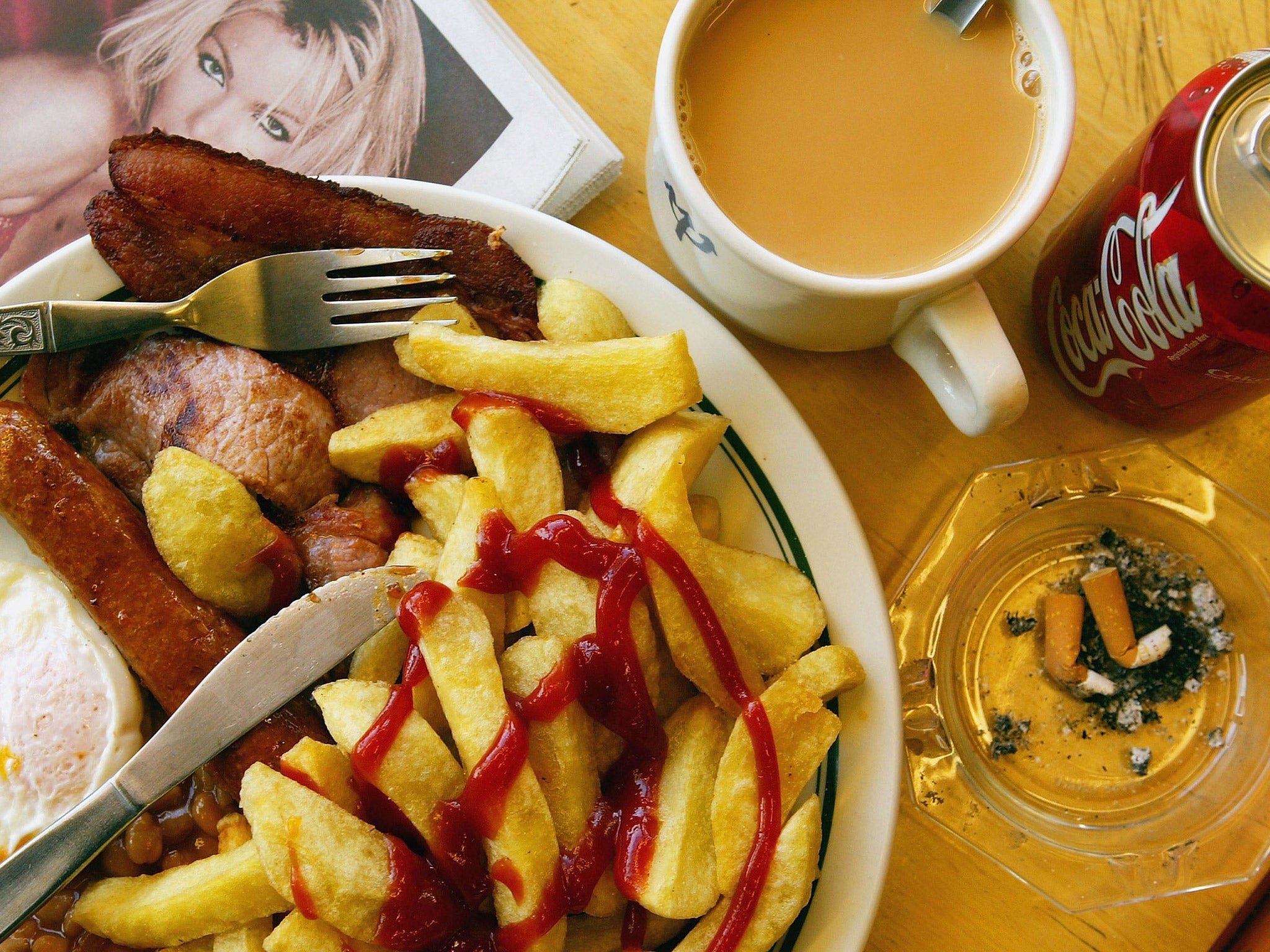Don’t blame the Government or the food industry if you’re a fatty like me – take responsibility for yourself and do something about it
If we were doing things right we’d tax the salt, fat and sugar content of all foods – but what a regressive tax that would be, adding many pounds to a family’s weekly food bill. Which politician is going to advocate a tax on bread?


Can we first of all agree that, as a nation, we are fatter than ever and that is a “bad thing”. Good. Can we also agree on what to do about it? Apparently not. Indeed ministers, reading between the lines, cannot even agree among themselves about who is to blame and what the best way forward is. A draft 50-page document laying out an official strategy has been slimmed down impressively to a mere 10 pages.
Number 10 has been responsible for a radically less statist approach. Out have gone proposed restrictions on “junk food” TV advertising, in favour of an emphasis on school sport. This has been interpreted as a victory for “Big Food” over the nation’s health. It is a bit more complicated than that.
I know that people have diseases that make them balloon; I know that mental health issues can push people into obesity, or eating disorders for that matter; I know that certain treatments, such as steroids, can also make people bigger involuntarily. For normally healthy people, though, surely it is a matter of individual responsibility.
I think much of the food trade behaves well, and many of us consumers do not, and prefer to blame the industry. But go into the supermarket and pick any packaged item up – chances are high that it will have all its nutritional data more or less clearly displayed. The best firms go for a “traffic light” approach, with red markings for sugar, salt or fats. Others will mark their data “per 100g” or “per helping”. You need to do a little mental arithmetic, say about how much of that roast chicken is going into your lunch, but the information you need is all there.
Although it is deeply unfashionable to praise McDonalds, I would just point out that each and every item on their menu has its calorific content clearly marked, and that without much effort you can find out the precise nutritional value of every single item on the McDonald’s menu. It’s quite fun, in a macabre way, to construct the worst possible bad meal – depending on whether you want to load up on sugar, fat or salt (the milkshakes are good for that). You can also put together a McDonald’s meal that is considerably more healthy than, say, a cheese sandwich and a coffee (chicken nuggets plus salad without dressing and a Coke Zero). By contrast, and rarely labelled as such, I discovered that a takeaway portion of fish and chips or a doner kebab will “cost” 1,000 calories, though you’d never know it in the average chippy.
Let’s take the so-called sugar tax on soft drinks. All I suspect this is doing is costing those who can least afford it more for their big bottle of Coke or Irn Bru. The additional few pennies won’t seriously affect their intake, and does nothing to restrict sugar, salt or fat consumption elsewhere. To give a fairly absurd example, I knew someone who’d go into a restaurant and order some gigantic burger with cheese and bacon added, plus fries or wedges and another side order of onion rings – but stressed that they simply had to have a Diet Coke. My point is that the soft drinks tax is too narrow and too symbolic to make any serious difference to obesity; and that people are very ignorant about the choices they are making in general.
If we were doing things right we’d tax the salt, fat and sugar content of all foods – but what a regressive tax that would be, adding many pounds to a family’s weekly food bill. Unlike tobacco or alcohol, punitive taxation on food items can’t be justified because you really do need to have them, and it is virtually impossible to avoid fat, sugar and salt in most things. Which politician is going to advocate a tax on bread?
As for exercise, well, the problem there is that it is just such an ineffective way to get the weight off. So it will take, say, about 40 minutes of running to burn off the calories from just one cheese sandwich. Or more than two hours in a gym to burn off some fish and chips washed down with a pint of ale. All sorts of exercise are usually good for all sorts of reasons, but, other things being equal, watching what you eat is much more efficient than trying to burn it all off by exercise. The reality is that most of us are too busy or lazy to do much exercise in any case. Far better to simply move around more. So don’t park yourself on the sofa for three hours – recently reported to be a particular danger – but break it up with a short walk. Get off a stop earlier if you’re using a bus or a train. Use the stairs at work. Wander down to the shops rather than drive. Just move around a bit.
The side order that is missing in this meal of a debate is the responsibility of each of us to watch what we eat and manage our diet responsibly. The Government could and should do far more to educate us about our diet, which would help a good deal. It’s odd that they do not. But, as I say, continually looking to blame the supermarkets, food manufacturers or even Theresa May for our chubbiness is no mind set to get those kilograms off. If you’re too fat, and you’re not suffering from some disease or undergoing some form of treatment that makes you so, you ought to take matters into your own hands.
I know of what I speak. A few months ago my GP told me my blood pressure was way too high. He gave me some medication, and I suggested I could lose some weight. Kindly but firm, he readily agreed, though I detected perhaps an element of weary scepticism in his responses. He stuck me on the scales anyway, and there I was, all 89.5kg of me, so just over the 14 stone mark. Oh dear – I was officially obese. About two months on I’m at the 80kg mark. Now I am merely “seriously overweight”, but my blood pressure is normal and I feel better for it, though my trousers no longer fit so well.
I knew what my main problem was with food. I knew very little about what I was eating, and cared less. Now I was forced to care, I had to learn some more. It is very easy to find this out, and there is lots of information on the NHS website. All your Recommended Daily Amounts are here. What is missing is the same sort of public health education campaign that worked so well with getting smoking down.
Tellingly, I was actually quite conscious about the value of fresh fruit and veg, because of the Government’s excellent “Five a Day” campaign. What I had no idea about, before I did a little research, was what a calorie was. I didn’t know if I was supposed to eat 100 or a million in a day. There was a report recently that we all underestimate how many calories we eat, so I was not alone. Nor did I have any idea about how much sugar, salt and various fats were in an average day’s consumption, just doing normal stuff like having a nice lunch and a meal with some wine of an evening.
I was a stranger to Recommended Daily Amounts. A cheese and pickle sandwich, I always assumed, was a pretty harmless, trivial snack. Then I found that it contained about half my fats for the day and a third of the calories. From one little sarnie! Teamed with a bag of crisps it was far too much of everything. I’d no idea.
There’s an excellent image on the Indy100 website in fact of how 100 calories looks with different foods. A friend of mine who’d had some heart trouble got me interested in this sort of thing, and a key element in success is to make a note of everything you eat – including even the milk in your tea. Keeping some sort of food diary is very important of you want to keep to your calorie/salt/sugar budget.
So is my attitude “I can do it – so can you”? Sort of. If you want my “secrets”, they’re very straightforward. Try and cut down on booze; virtually ban stuff that is obviously bad, curiously often starting with a “C” – croissants, chocolate, curries, cheese, cake, cream. Switch to skimmed milk. Explore tasty stuff that is very low calorie – chilli-flavoured rice cakes are a favourite of mine. Don’t add salt or sugar to anything. Avoid sauces and dressings. Ban ready meals. Buy the tastiest, often expensive, tomatoes and salads you can manage, because it won’t seem like such a hardship if they are palatable.
Don’t worry about carbs; spuds, bananas and rice give you essential energy and fibre. Don’t skip breakfast. And please don’t go for any fad diets – paleo, Atkins, 5:2, whatever. They distort your choices, feel too much like rules and are thus unsustainable (famously so). You can still have a slice of cake for someone’s birthday at work, or get drunk at a wedding. You just have to make up for your excesses later on. It isn’t about punishing yourself, but just taking a bit more care, and some interest in what’s going in your gob.
I wish that the Government had got the messages through to me about salt, sugar and calories years ago, and I hope they will really push those messages now. Even so, most of us are the shape we are though individual choices. No-one forces us down to Burger King or to guzzle a packet of choccie digestives in one sitting, and we know it’s not good for us. I no longer need a government obesity strategy because I have my own personal one. But many of us still need education, help and encouragement.



Join our commenting forum
Join thought-provoking conversations, follow other Independent readers and see their replies